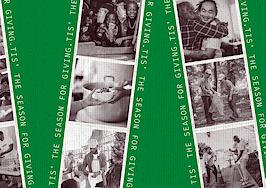This report is available exclusively to subscribers of Inman Intel, a data and research arm of Inman offering deep insights and market intelligence on the business of residential real estate and proptech. Subscribe today.
The past several years have been strenuous for the real estate industry, with the COVID-19 pandemic, record-breaking natural disasters, rapid market shifts and economic worries pushing agents and brokerages to the brink.

Alexia Rodriguez | KW Cares
Alexia Rodriguez, the chief executive of KW Cares, Keller Williams’ philanthropic arm, had a front-row seat to agents’ struggles with her leading efforts to disperse more than $13.6 million in aid since 2021, when she was named CEO of the nonprofit, which celebrates its 20th year in operation this year.
Rodriguez said KW Cares is already on pace to surpass its 2022 giving, with the organization awarding 112 grants worth $1.5 million between January and May. The nonprofits’ lifetime giving total reached $60 million this year.
“When there’s a challenging real estate market, the need for financial assistance is heightened,” she said. “Agents aren’t selling as many houses and they don’t have as much disposable income.”
“For some, they aren’t able to meet their basic needs, whether it be medical bills or housing costs,” she added. “That’s where we step in.”
As the industry braces for more difficult times ahead, Rodriguez said it’s important for brokerages to create a system for in-house giving. Not only does it help agents in the short-term to weather personal challenges, she said, but it leads to long-term loyalty and community.
“Research shows that companies that have employee hardship funds, 72 percent of employees who’ve received assistance are committed to staying with a company long-term because they feel the company has their back,” she said.
Intel: Twenty years is a huge milestone. What are your feelings about reaching this milestone and how KW Cares has evolved over that time?
Rodriguez: For KW Cares to be part of [Keller Williams’] mission and part of the impact we’ve made in the last 20 years is exceptional. As you’ve seen from our website, we’ve given over $60 million in grants and assistance over that 20 years, which is pretty remarkable. The impact that we’ve made on our Keller Williams agents and their immediate family members is something we feel really proud of.
[KW Cares] got started because of the market centers. Austin was doing a grassroots effort, and when former CEO Mo Anderson heard about what they were doing she brought it to KWRI, and the company made a decision to do this on a national level. We’re just really proud of what we’ve been able to do and who we’ve been able to impact.
That’s amazing. I read the KW Cares website and saw a highlight reel of your largest relief projects, which include offering support for communities impacted by Hurricane Katrina, Sandy, Harvey, Ida and Ian. How are you able to strategize and mobilize so quickly in disaster-stricken areas?
We partner with the regions that are affected during that disaster so we can do two things: Provide needs-based emergency grants to our agents or their qualifying immediate family members. Those emergency grants are up to $5,000 during a natural disaster so folks that are displaced can have their basic needs covered, such as lodging, food, the replacement of clothes and toiletries and those kinds of things.
We also have a warehouse in Austin that’s stocked with generators, extension cords, gas cans, etc. and we send them to impacted areas with our KW Cares trailers. That’s where we really partner with our awesome regional leaders out in the field. The market centers have a group of volunteers that are there to receive the KW Cares disaster relief supplies and they set up what’s called a command center to distribute the supplies.
Another thing that we do in partnership with regional leaders is finding contractors to help the folks in the community whose houses have been affected. Those leaders identify local vendors who are trustworthy and out there in the community. Then we pay contractors to tarp the roof, remove debris and remove water from inside folks’ houses to mitigate damage and help folks get back on their feet faster.
Leveraging local leaders is definitely a smart strategy. And as you were talking, I thought about Keller Williams’ decision to call its annual conference a family reunion. It’s clear that family-focused culture helps KW Cares act quickly and effectively.
Exactly. Our tagline is “Family, helping family.” It really is true, and I think we do this at such a high level. All of our funding comes only from KW agents. We don’t receive funding from any government resources or foundations, and I think that’s a really beautiful model.
People give with every transaction. They set it up in Command, and they’ll say, “Okay, I want to give $10 with every transaction I make,’ and that automatically comes over to KW Cares. Eighty percent of our annual funding stream comes from that transactional giving.
People give because they know it’s going to help someone in the KW ecosystem, even though they will probably never even meet that person.
In addition to supporting agents and their families through natural disasters, KW Cares also stepped up a lot during the early days of the pandemic, which I’d imagine put immense pressure on your team.
What have you guys learned over the past few years in helping guide your ecosystem through an unprecedented and ongoing crisis? How do you anticipate those lessons will help KW Cares in the future?
That’s a good question. So I’ve already explained our emergency grants for natural disasters, but we also do life-altering grants, and those grants are up to $30,000 depending on the individual’s need. One of the biggest things that I’ve learned is that we just have to be really flexible and be able to pivot because our society is constantly changing.
I started [my position] during COVID and that year we primarily gave medical-based grants — not necessarily all for COVID — to help agents who were diagnosed with cancer, agents struggling with diabetes or in need of a prosthetic, for example. You add that in with Hurricane Ida, and we were able to meet the needs of our folks that we had never done before.
So, I guess the biggest lesson that we learned at KW Cares is that we have to be responsive. We have to be able to pivot quickly, and we just have to be very flexible and create systems that can meet the changing needs of our folks.
Last year was a huge year for KW Cares, but you’ve already outpaced your first and second quarter 2022 giving by 47 percent. Talk to me about that growth in giving.
I’ll go back to the systems that we create. They’re flexible and they’ve allowed us to be able to respond this year at a really high level with 121 grants worth $1.5 million.
What we see at KW Cares is when there’s a challenging real estate market, the need for financial assistance is heightened. Agents aren’t selling as many houses and they don’t have as much disposable income. For some, they aren’t able to meet their basic needs, whether it be medical bills or housing costs.
That’s really what’s driven the amount of money that we’ve given out this year. Again we’re just really excited and really proud that we’re able to serve folks during these times when they need it most.
There’s a lot of focus and advice on how agents can give back, but this conversation is an important reminder that agents need help too. How can brokerage leaders step up to create systems that support their agents in their time of need?
I encourage real estate brokerages or larger companies like KWRI to really think about setting up this kind of employee hardship fund, and there are a few reasons why I make that recommendation.
One is what we found at KW Cares is that our associates feel so grateful and so relieved to know that there is an organization within their real estate ecosystem that’s there for them if they ever need it. And obviously, they’re super grateful when they receive a grant.
What we’ve also found is that because agents understand and know that [grants] are available to them, it can help them focus on their productivity when they know help is available if they need it. Research also shows that companies that have these employee hardship funds, find 72 percent of employees who’ve received assistance are committed to staying with a company long-term because they feel the company has their back.
They also know they’re connected to their co-workers or other agents because they know those are the folks that have donated to help them when they need it the most.
Definitely. I know first-hand how important it is to be part of a supportive company during an illness or while experiencing another life-altering event. What are some best practices leaders can follow to create a fund like KW Cares?
The most important tip is that an employee hardship fund really needs to be embedded in the company culture. For that to happen, executive management at the very top level of the company needs to be the biggest champion of this kind of fund. They need to promote it personally and advocate for it.
The second thing is that the company needs to remind folks that an employee hardship fund exists, and they need to do that regularly through emails, company meetings, onboarding opportunities and fundraising campaigns.
The third tip is that there should be an easy avenue for agents or associates to give whether it’s through a payroll deduction or set-it-and-forget-it functionality on your transaction platform, where someone can make set, automatic donation at the completion of a transaction.
The last thing I’d say is that a company needs to give their nonprofit many opportunities throughout the year to promote awareness about the good work that they do, so they can share stories and connect with agents, encourage donations and promote that company culture. I think KWRI has done this so well in terms of giving KW Cares these operational opportunities and making us the heart of our company culture.
I’ve heard creating a nonprofit takes a lot of effort and work, especially when it comes to filing a 501(c)3 and properly creating systems for accountability and giving. But, we all know that disasters and hardships don’t wait. What are some other giving avenues leaders and agents can look into if a nonprofit arm isn’t already in place?
For agents that work at an organization that doesn’t have already an established employee hardship fund and they’re looking to give their money to a nonprofit or philanthropic organization that’s doing good work, I have two recommendations.
They should look at the impact that nonprofit is making in terms of what their mission is, and every nonprofit should have an annual report that explains that. The report should include all sorts of transparent information about their financials, and that’s critical in evaluating the success of that company’s mission.
The other thing to look at is whether a nonprofit has achieved certain status with a third-party evaluator, like Candid or Charity Navigator. KW Cares has gone through that process — we have platinum status with Candid and we have a similar status with Charity Navigator.
When you’re looking at giving your hard-earned dollars, make sure to give it to a nonprofit that has got all of its ducks in a row and can prove that publicly and transparently.













